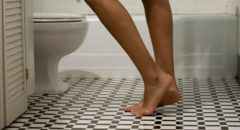
One may assume that douching is not as common in 2015, but nearly one in four women between the ages 15 and 44 still douche today, according to WomensHealth.gov. Furthermore, Black and Latina women are more likely to douche compared to white women.
Although douching may seem like the clean thing to do, the reality is that douching can lead to serious health problems and most doctors don’t recommend it. Some of the risks associated with douching include UTIs, yeast infections and cervical cancer, but a new study published in the journal Environmental Health suggests that women who douche could be exposing themselves to harmful chemicals known as phthalates.
The researchers closely examined the urine samples of 739 women between the ages of 20 and 49 and documented whether the women used any feminine hygiene products (douching products, wipes, tampons, pads, etc.). The data was compiled from the 2001-2004 National Health and Nutrition Examination survey. What they found was that women who douched at least twice a month had higher traces of phthalates in their urine by a whopping 152 percent! It’s also important to point out that Black women had higher exposure levels (48.4 percent) compared to white women.
“The normal flora of the vagina consists of three organisms: acidic bacteria (lactobacillus), alkaline bacteria and yeast (candida). The acidic bacteria is the most friable and the most affected by douching,” explains Dr. Bola Oyeyipo, a family physician in San Antonio, Texas and co-founder of Healthgist.com.
MUST READ: Dr. Drai Says: "Leave Your Vagina Alone!"
She adds: “A decline in the acidic bacteria level leads to an overgrowth of the alkaline bacteria and yeast-causing bacterial vaginosis or vaginal candidiasis. Douching is not the only habit that leads to an overgrowth of the alkaline bacteria and yeast. Regular use of tampon and pads have been shown to slightly increase the risk as well.”
Because phthalates can be found in tampons and pads, there is a small risk associated with using them, but here is what Ami R. Zota, leader of the study and assistant professor of environmental and occupational health at the George Washington University School of Public Health and Health Services, had to say (in a statement) regarding the safety of tampons and pads:
“It is possible that the phthalates from products specifically used during menstruation [like tampons and pads] may have cleared out of the body in women who were surveyed several weeks after menstruation … The products designed for external use [like pads and wipes] result in less exposure.”
Additional research is required and as of now, there’s no need to swear off tampons and pads, but definitely steer clear of douching. In the meantime, here are a few tips from Dr. Oyeyipo how women can limit “the risks of developing bacterial vaginosis or vaginal candidiasis when using tampons or pads”:
- Change tampons and pads regularly.
- Eat yogurt or use probiotics to maintain the acidic bacteria levels.
- Limit waxing or use of scented female hygiene products.
For more great articles, click here.








